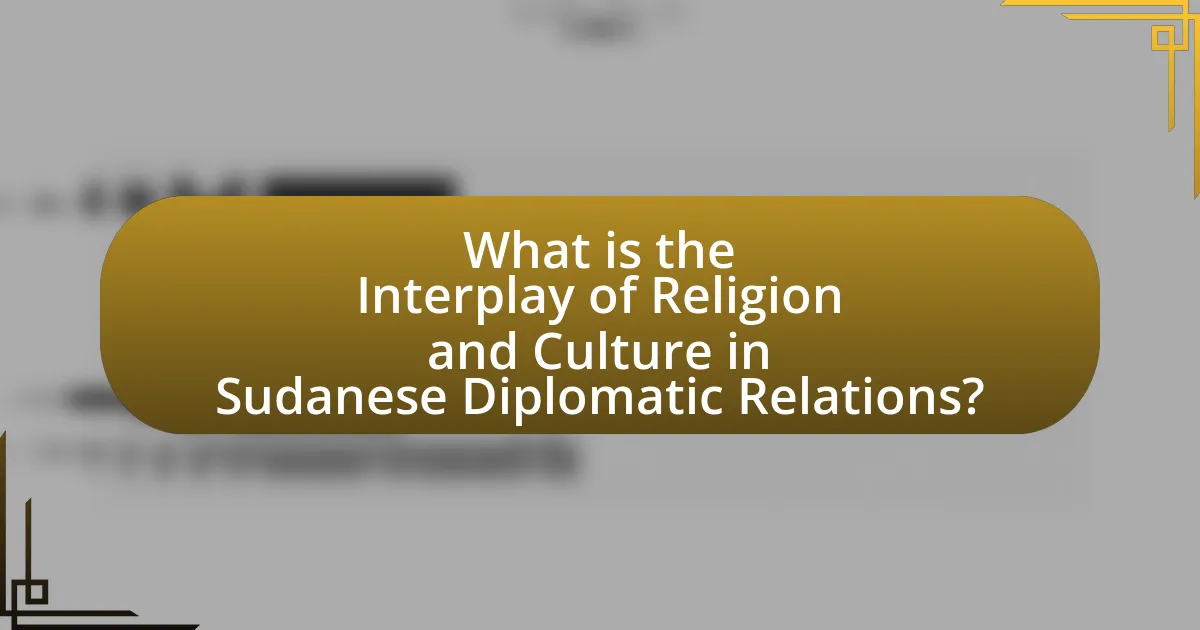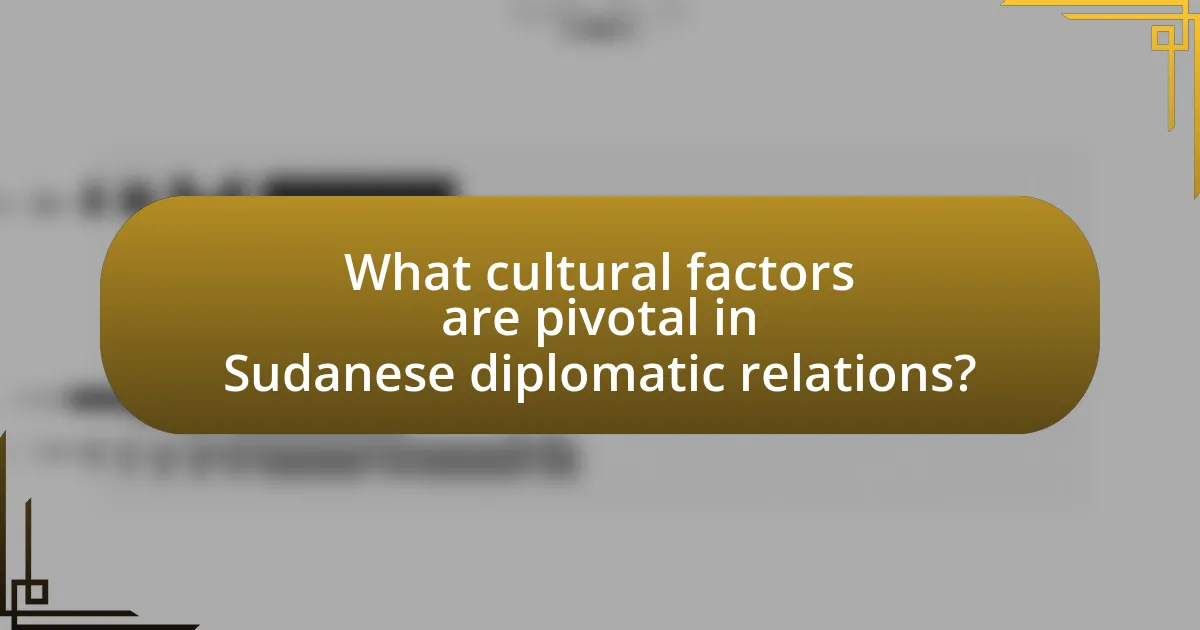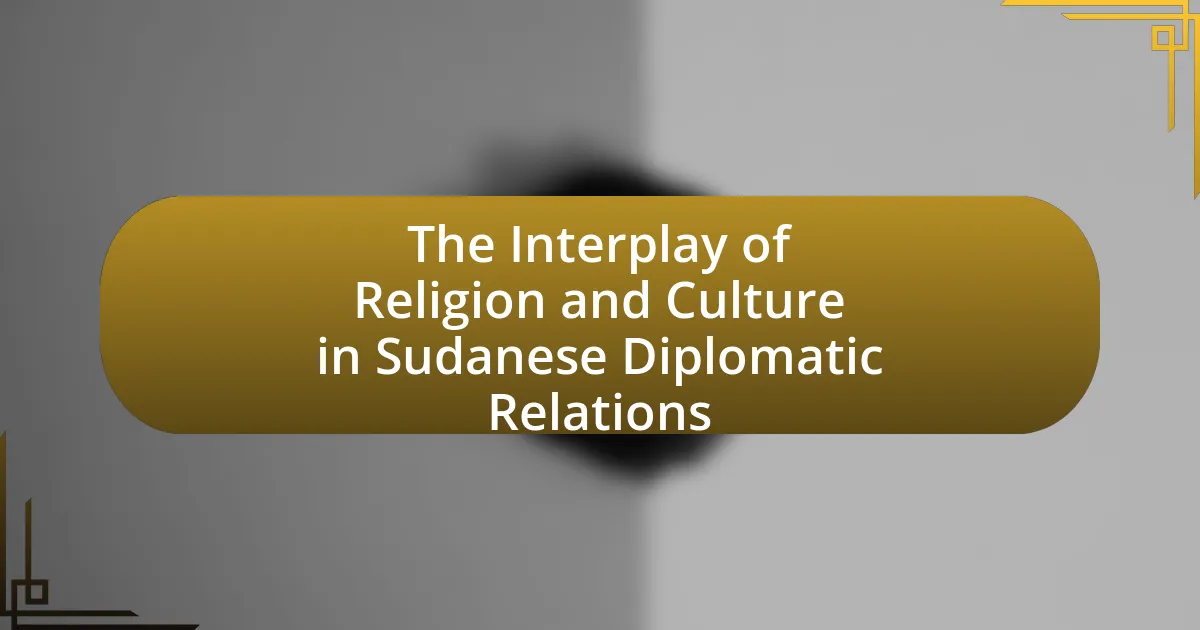The article examines the significant interplay of religion and culture in shaping Sudanese diplomatic relations, highlighting how Islamic principles and cultural diversity influence the nation’s foreign policy and international interactions. It discusses the historical ties with Arab nations, the impact of ethnic diversity on negotiations, and the role of religious leaders in diplomatic decisions. Additionally, the article explores the challenges posed by religious diversity, the importance of cultural awareness in negotiations, and best practices for enhancing diplomatic effectiveness through cultural strengths and education. Understanding these dynamics is crucial for comprehending Sudan’s global standing and its approach to international partnerships.

What is the Interplay of Religion and Culture in Sudanese Diplomatic Relations?
The interplay of religion and culture in Sudanese diplomatic relations significantly influences the nation’s foreign policy and international interactions. Sudan, predominantly Muslim, integrates Islamic principles into its governance and diplomatic strategies, affecting its relationships with both Islamic and non-Islamic countries. For instance, Sudan’s historical ties with Arab nations are rooted in shared religious beliefs, which facilitate cooperation in political and economic spheres. Conversely, cultural factors, such as ethnic diversity and local customs, also shape diplomatic engagements, as seen in Sudan’s approach to negotiations with South Sudan, where cultural understanding plays a crucial role in peace processes. This complex relationship underscores how religion and culture are intertwined in shaping Sudan’s diplomatic landscape, impacting its alliances and international standing.
How do religion and culture influence Sudan’s diplomatic strategies?
Religion and culture significantly influence Sudan’s diplomatic strategies by shaping its international relationships and policy decisions. The predominance of Islam in Sudanese society informs its alignment with other Muslim-majority countries, fostering alliances based on shared religious values and cultural practices. For instance, Sudan’s historical ties with Arab nations are rooted in cultural and religious commonalities, which have guided its foreign policy towards cooperation in regional conflicts and economic partnerships. Additionally, cultural factors, such as tribal affiliations and ethnic diversity, impact diplomatic negotiations, as Sudan often seeks to balance the interests of various groups within its borders while engaging with external partners. This interplay of religion and culture is evident in Sudan’s approach to issues like the Darfur conflict, where cultural identities play a crucial role in both domestic and international discourse.
What role does Islam play in shaping Sudan’s foreign policy?
Islam significantly influences Sudan’s foreign policy by guiding its diplomatic relations, particularly with other Muslim-majority nations. The Sudanese government often leverages its Islamic identity to foster alliances and gain support from countries like Saudi Arabia and Egypt, which share similar religious values. This alignment is evident in Sudan’s participation in the Organization of Islamic Cooperation and its historical ties to the Arab League, reinforcing its commitment to Islamic solidarity. Additionally, Sudan’s foreign policy decisions, such as its stance on conflicts in the Middle East, are frequently framed within an Islamic context, reflecting the country’s desire to uphold Islamic principles in international relations.
How does Sudanese culture affect its international partnerships?
Sudanese culture significantly influences its international partnerships through its emphasis on Islamic values and social norms. The predominance of Islam in Sudanese society shapes diplomatic relations, as countries with similar cultural and religious backgrounds often find common ground, facilitating cooperation. For instance, Sudan has historically aligned itself with other Muslim-majority nations, such as those in the Arab League, which has led to collaborative efforts in trade, security, and political support. Additionally, Sudanese cultural practices, such as hospitality and respect for elders, foster trust and rapport in diplomatic engagements, enhancing the effectiveness of negotiations and partnerships.
Why is understanding this interplay important for Sudan’s global standing?
Understanding the interplay of religion and culture is crucial for Sudan’s global standing because it shapes the nation’s diplomatic relationships and influences international perceptions. Sudan’s diverse religious landscape, primarily comprising Islam and indigenous beliefs, affects its political dynamics and social cohesion, which in turn impacts its ability to engage effectively with other nations. For instance, Sudan’s historical ties with Arab nations are rooted in shared cultural and religious values, while its relationships with Western countries are often complicated by differing views on governance and human rights. This complexity necessitates a nuanced understanding of how religion and culture inform Sudan’s foreign policy and international collaborations, ultimately determining its position and influence on the global stage.
What historical events highlight the significance of religion and culture in Sudanese diplomacy?
The signing of the Comprehensive Peace Agreement in 2005 highlights the significance of religion and culture in Sudanese diplomacy, as it marked the end of a prolonged civil war influenced by religious and cultural divisions between the predominantly Muslim north and the largely Christian and indigenous belief systems in the south. This agreement was facilitated by international actors who recognized the need to address these religious and cultural disparities to achieve lasting peace. Additionally, the 2011 secession of South Sudan further underscored the role of cultural identity and religious affiliations in shaping diplomatic relations, as the new nation emerged from a complex historical context rooted in these factors.
How do Sudan’s cultural values impact its negotiation tactics?
Sudan’s cultural values significantly influence its negotiation tactics by emphasizing respect, hospitality, and community consensus. These values lead negotiators to prioritize relationship-building and trust over aggressive bargaining strategies. For instance, Sudanese negotiators often seek to establish personal connections and demonstrate respect for cultural traditions, which can facilitate smoother discussions and foster long-term partnerships. Additionally, the importance of collective decision-making in Sudanese culture means that negotiators may involve multiple stakeholders to ensure that agreements reflect the interests of the broader community, thereby enhancing the legitimacy and acceptance of the outcomes.
How does Sudan’s religious diversity affect its diplomatic relations?
Sudan’s religious diversity significantly influences its diplomatic relations by shaping its interactions with various countries and international organizations. The presence of multiple religious groups, including Islam, Christianity, and indigenous beliefs, creates a complex landscape that affects Sudan’s foreign policy decisions and alliances. For instance, Sudan’s predominantly Muslim population has historically aligned it with other Islamic nations, impacting its relationships with countries like Saudi Arabia and Egypt. Conversely, the Christian minority and the country’s historical ties to the West, particularly during the colonial period, have led to fluctuating relations with Western nations, especially regarding human rights and religious freedoms. This interplay of religious affiliations and cultural identities complicates diplomatic negotiations, as Sudan must navigate the expectations and interests of diverse religious stakeholders both domestically and internationally.
What are the major religious groups in Sudan and their influence on diplomacy?
The major religious groups in Sudan are Islam, Christianity, and indigenous African religions, with Islam being the predominant faith, practiced by approximately 97% of the population. The influence of these religious groups on diplomacy is significant, as Islamic principles often guide Sudan’s foreign policy, particularly in relations with other Muslim-majority countries. For instance, Sudan’s alignment with the Arab League and its participation in the Organization of Islamic Cooperation reflect the impact of Islam on its diplomatic stance. Additionally, the presence of Christian communities, particularly in South Sudan, has led to complex diplomatic interactions, especially following South Sudan’s independence in 2011, which was influenced by religious and cultural factors. The interplay of these religious groups shapes Sudan’s international relations and its approach to regional conflicts, highlighting the importance of religion in its diplomatic framework.
How does the presence of Christianity and indigenous beliefs shape diplomatic interactions?
The presence of Christianity and indigenous beliefs significantly shapes diplomatic interactions in Sudan by influencing cultural values and social norms. These religious frameworks often dictate the priorities and perspectives of various groups, affecting negotiations and alliances. For instance, the coexistence of Christianity and indigenous beliefs has led to a complex social fabric where diplomatic efforts must navigate religious sensitivities, as seen in peace agreements that consider both Christian and indigenous perspectives to foster inclusivity. Historical instances, such as the Comprehensive Peace Agreement of 2005, illustrate how acknowledging these beliefs can facilitate dialogue and reconciliation between diverse communities, ultimately impacting the stability and effectiveness of diplomatic relations in Sudan.
What challenges arise from religious diversity in Sudan’s foreign relations?
Religious diversity in Sudan presents significant challenges to the country’s foreign relations, primarily due to conflicting interests among various religious groups. The presence of Islam as the dominant religion, alongside significant Christian and indigenous beliefs, creates tensions that can affect diplomatic engagements. For instance, Sudan’s historical alignment with Islamic nations often complicates relationships with predominantly Christian countries, particularly in the West, leading to diplomatic isolation and economic sanctions. Additionally, internal religious conflicts can spill over into foreign policy, as seen in Sudan’s support for certain factions in regional conflicts, which may not align with the interests of its diverse religious population. This complexity is evident in Sudan’s foreign relations, where balancing these diverse religious perspectives is crucial for maintaining stability and fostering international partnerships.
How do religious leaders influence Sudan’s diplomatic decisions?
Religious leaders in Sudan significantly influence the country’s diplomatic decisions through their authority and the moral guidance they provide to the populace and government. Their positions allow them to shape public opinion and political discourse, often advocating for policies that align with Islamic principles, which can affect Sudan’s international relations, particularly with Muslim-majority countries. For instance, during the transitional period following the ousting of Omar al-Bashir in 2019, religious leaders played a crucial role in the peace negotiations and the formation of a new government, emphasizing the need for a government that reflects Islamic values. This influence is evident in Sudan’s diplomatic engagements, where religious leaders often serve as intermediaries in negotiations and help to legitimize the government’s foreign policy decisions, particularly in matters related to regional stability and cooperation with other Islamic nations.
What role do religious institutions play in shaping public opinion on foreign policy?
Religious institutions significantly influence public opinion on foreign policy by providing moral frameworks and interpretations that shape followers’ views. In many societies, these institutions act as intermediaries between the government and the populace, often mobilizing their congregations around specific foreign policy issues based on religious teachings. For instance, in Sudan, religious leaders have historically played a crucial role in shaping attitudes toward international relations, particularly during conflicts, by framing foreign interventions through a religious lens. This influence is evident in how religious narratives can either support or oppose government policies, impacting public sentiment and political discourse.
How do religious leaders engage with government officials in diplomatic matters?
Religious leaders engage with government officials in diplomatic matters primarily through dialogue and collaboration on social issues. In Sudan, for instance, religious leaders often participate in peace negotiations and conflict resolution efforts, leveraging their moral authority to influence political decisions. This engagement is evident in historical contexts, such as the role of religious figures in the Comprehensive Peace Agreement of 2005, which aimed to end the civil war in Sudan. Their involvement helps bridge gaps between communities and the government, fostering a more inclusive approach to governance and diplomacy.

What cultural factors are pivotal in Sudanese diplomatic relations?
Cultural factors pivotal in Sudanese diplomatic relations include the influence of Islam, tribal affiliations, and historical ties with neighboring countries. Islam shapes diplomatic interactions by promoting solidarity among Muslim-majority nations, fostering cooperation on issues like trade and security. Tribal affiliations impact negotiations and alliances, as loyalty to tribal leaders can influence political decisions. Additionally, Sudan’s historical connections with Egypt and other neighboring countries create a framework for regional diplomacy, emphasizing shared cultural heritage and mutual interests. These elements collectively guide Sudan’s approach to international relations, reflecting its unique cultural landscape.
How does Sudan’s cultural heritage influence its international image?
Sudan’s cultural heritage significantly influences its international image by showcasing its rich history, diverse ethnic groups, and unique traditions. The presence of ancient civilizations, such as the Kingdom of Kush, and UNESCO World Heritage Sites like the Pyramids of Meroë highlight Sudan’s historical significance. Additionally, the country’s cultural practices, including music, dance, and art, reflect a blend of African and Arab influences, which can enhance its appeal on the global stage. This cultural richness can foster diplomatic relationships by promoting tourism and cultural exchanges, thereby improving Sudan’s reputation internationally.
What aspects of Sudanese culture are emphasized in diplomatic communications?
Sudanese diplomatic communications emphasize respect for cultural traditions, the importance of community, and the role of religion in social and political life. These aspects are crucial as they reflect Sudan’s diverse ethnic and religious landscape, which includes Islam as a predominant influence. The acknowledgment of cultural heritage fosters mutual understanding and cooperation in international relations, as seen in Sudan’s engagement with various nations that respect its cultural values. Additionally, the emphasis on communal ties highlights the significance of collective decision-making and consensus in Sudanese society, which is often mirrored in diplomatic negotiations.
How do cultural festivals and events contribute to diplomatic relations?
Cultural festivals and events significantly enhance diplomatic relations by fostering mutual understanding and respect among nations. These gatherings provide a platform for cultural exchange, allowing countries to showcase their traditions, arts, and values, which can lead to stronger interpersonal connections between diplomats and citizens. For instance, the annual Sudanese Cultural Festival promotes Sudan’s rich heritage, facilitating dialogue and collaboration with international participants, thereby strengthening bilateral ties. Such events often result in increased tourism, trade opportunities, and collaborative projects, as evidenced by the growth in cultural diplomacy initiatives that have been shown to improve international relations and cooperation.
What are the implications of cultural misunderstandings in diplomacy?
Cultural misunderstandings in diplomacy can lead to significant consequences, including strained relationships, miscommunication, and failed negotiations. For instance, when diplomats misinterpret cultural norms or values, it can result in actions that are perceived as disrespectful or offensive, undermining trust and cooperation. Historical examples, such as the 2003 Iraq invasion, illustrate how cultural ignorance can exacerbate conflicts and hinder diplomatic efforts. Furthermore, research indicates that effective cross-cultural communication is essential for successful diplomacy, as it fosters mutual understanding and respect, which are critical for resolving disputes and building alliances.
How can cultural awareness improve Sudan’s diplomatic effectiveness?
Cultural awareness can significantly enhance Sudan’s diplomatic effectiveness by fostering better communication and understanding with diverse international partners. By recognizing and respecting the cultural values, traditions, and social norms of other nations, Sudan can build stronger relationships, reduce misunderstandings, and facilitate more productive negotiations. For instance, Sudan’s historical ties with Arab and African nations highlight the importance of cultural sensitivity in diplomatic engagements, as it allows for tailored approaches that resonate with the specific cultural contexts of these countries. This understanding can lead to more effective collaboration on regional issues, such as peacekeeping and economic development, ultimately strengthening Sudan’s position on the global stage.
What strategies can be employed to bridge cultural gaps in negotiations?
To bridge cultural gaps in negotiations, employing strategies such as active listening, cultural awareness training, and building relationships is essential. Active listening allows negotiators to fully understand the perspectives and values of their counterparts, fostering mutual respect. Cultural awareness training equips negotiators with knowledge about different cultural norms and practices, which can prevent misunderstandings and promote effective communication. Building relationships through informal interactions can create trust and rapport, making formal negotiations more productive. These strategies are supported by research indicating that effective cross-cultural communication significantly enhances negotiation outcomes, as demonstrated in various international diplomatic contexts.
What best practices can enhance the interplay of religion and culture in Sudanese diplomacy?
Best practices that can enhance the interplay of religion and culture in Sudanese diplomacy include fostering interfaith dialogue, promoting cultural exchange programs, and integrating religious leaders into diplomatic discussions. Interfaith dialogue can build mutual understanding and respect among diverse religious groups, which is crucial in a country with a rich tapestry of beliefs. Cultural exchange programs can showcase Sudan’s heritage and values, facilitating stronger ties with other nations. Additionally, involving religious leaders in diplomatic efforts can lend credibility and moral authority to negotiations, as seen in various peace processes globally where religious figures have played pivotal roles in conflict resolution.
How can Sudan leverage its cultural strengths in international relations?
Sudan can leverage its cultural strengths in international relations by promoting its rich heritage, diverse traditions, and historical significance to foster diplomatic ties and enhance its global image. The country’s unique cultural identity, which includes a blend of Arab and African influences, can be showcased through cultural diplomacy initiatives such as art exhibitions, music festivals, and educational exchanges. For instance, Sudan’s ancient civilizations, like the Kingdom of Kush, provide a historical narrative that can attract interest and collaboration from countries seeking to engage with Africa’s cultural roots. Additionally, Sudan’s cultural practices, such as traditional crafts and cuisine, can serve as tools for soft power, enabling the nation to build partnerships and strengthen its presence on the international stage.
What role does education play in fostering a better understanding of religion and culture in diplomacy?
Education plays a crucial role in fostering a better understanding of religion and culture in diplomacy by equipping diplomats with the knowledge and skills necessary to navigate complex cultural landscapes. Through formal education, diplomats learn about the historical, social, and religious contexts that shape the beliefs and practices of different societies. For instance, programs that include cultural studies and religious education enable diplomats to appreciate the nuances of local customs and values, which is essential for effective communication and negotiation. Research indicates that diplomats who undergo cultural competency training are more successful in building relationships and resolving conflicts, as they can engage with diverse perspectives and avoid misunderstandings. This understanding is particularly relevant in regions like Sudan, where religion and culture significantly influence diplomatic interactions.

Leave a Reply